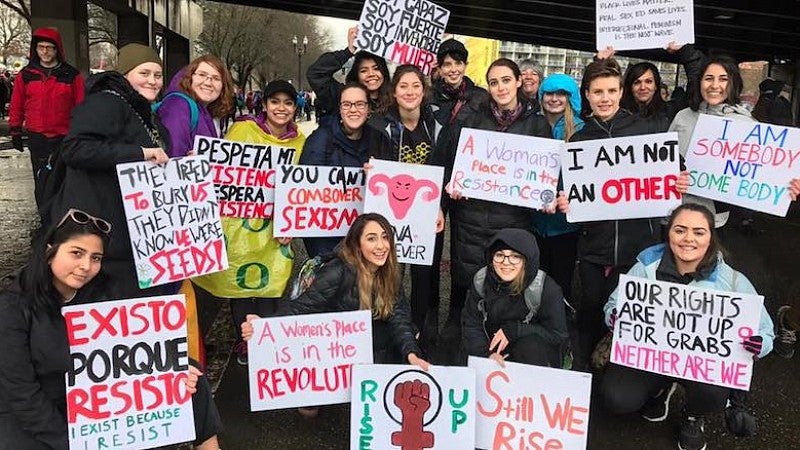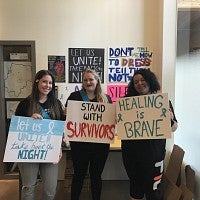
Editor’s note: This post is the first in an ongoing series of student opinion pieces about issues in communication ethics. Check back on the #LifeasaJStudent Blog for future posts in the series. Know of a journalist or news organization that made ethical decisions while publishing a story in 2019? Nominate them by February 15 for the Ancil Payne Award for Ethics in Journalism.
Can I be a journalist and an activist — and do both well?
It’s a question that used to keep me up at night, one I endlessly debated with anyone who would listen.
For a long time, journalists have claimed total objectivity. Many have decided they are only chroniclers of events. I’ve even heard of journalists who won’t vote for fear it would affect their image of objectivity.
The problem with this dichotomy becomes apparent when we recognize that humans aren’t inherently objective. Journalists are humans too, aren’t we?
I was an activist before I was a journalist. I’ve always been involved in activism, particularly since 2016. Currently, I work at the UO Women’s Center, a feminist collective working to end societal oppression.
I ventured into journalism in high school, when I joined the yearbook staff. It was not until very recently that I began to call myself a journalist.
Now I’ve realized that being an activist makes me a better journalist.
Journalism has been activism since its inception. Journalists documenting the slums of New York were activists. Ida B. Wells was an investigative journalist who founded the NAACP. And journalists have continually exposed massive injustices within schools, governments and businesses.
Journalism that stands for something and works for the people it represents is better journalism. Journalists cannot remain the mythically objective observers some think we should be. I’m reminded of a quote from Elie Wiesel, who said, “We must always take sides. Neutrality helps the oppressor, never the victim. Silence encourages the tormentor, never the tormented.” Journalism is the silence-breaker, and we must acknowledge the important role it plays in societal, cultural and political change.
The journalistic works that expose, raise awareness and create change are the most impactful. In recent years, journalists have faced deeper and deeper scrutiny for their coverage, often receiving criticism for unfair or manipulative coverage and a lack of empathy for the subject.
I feel the only way to lessen the divide between the media and the people is to show everyone that the media are people. The conversations I have had around this are varied. Some think I'm being ridiculous and that journalists can never tell good stories if they aren't objective. Others think it's a great concept. Most fall somewhere in between.
After the Parkland shooting at Marjory Stoneman Douglas High School, students who survived the attack were interviewed all over national media outlets. It was one of these interviews that solidified my choice to proudly serve as both an activist and a journalist.
Rebecca Schneid, who was at the time the co-editor-in-chief of the school newspaper, said, “The purpose of journalism is to raise the voices of people who maybe don’t have a voice. There is a distinction for me, as a journalist, and also someone who wants to demand change, but I think the partnership of the two is the only reason that we are able to make change.”

This doesn’t necessarily mean a journalist should inject their personal views into a story. In fact, I think that’s harmful. The understanding that journalists are given a powerful platform to share stories and have a responsibility to tell the stories that need to be heard the most makes better journalists and fosters a connection between the media and the people.
The goal of journalism, as I see it, is to tell stories. To be good, fair and accurate journalists, we have to tell everyone’s stories. Stories of injustice, oppression and marginalization are essential in creating an accurate depiction of our world — because they are a part of the world.
This form of journalism is on the rise. It’s been called solutions journalism, activism journalism, engagement journalism and many other words. Whatever you want to call it, it results in more impactful stories, more invested audiences and better journalism for a better world.
Can I be both a journalist and an activist? Now, in my last year of college, this question feels as daunting as ever, even though I have accepted that I am. What has reassured me the most as I begin searching for post-grad jobs is something Professor of Practice Torsten Kjellstrand told me a few years ago, when I expressed concern about putting my activism on my resume: “If they don’t want you because of that, do you really want them?”
Since I’ve reconciled my identity as both a journalist and an activist, I’ve embraced the way it impacts my work and the stories I tell. It’s one of the first things to appear in any “about me” section I fill out, and it’s a part of what makes a thoughtful journalist.
I encourage every journalist — and every activist — to think about the ways we can learn from each other. There is so much to gain from leaving behind the fallacy of objectivity and moving toward the impactful, truth-seeking and world-changing journalists we can become.

Know of a journalist or news organization that faced an ethical dilemma while publishing a story in 2019? Nominate them by Feb. 15 for the SOJC's 2020 Ancil Payne Award for Ethics in Journalism. This year’s 20th anniversary winner will receive a $10,000 prize.
